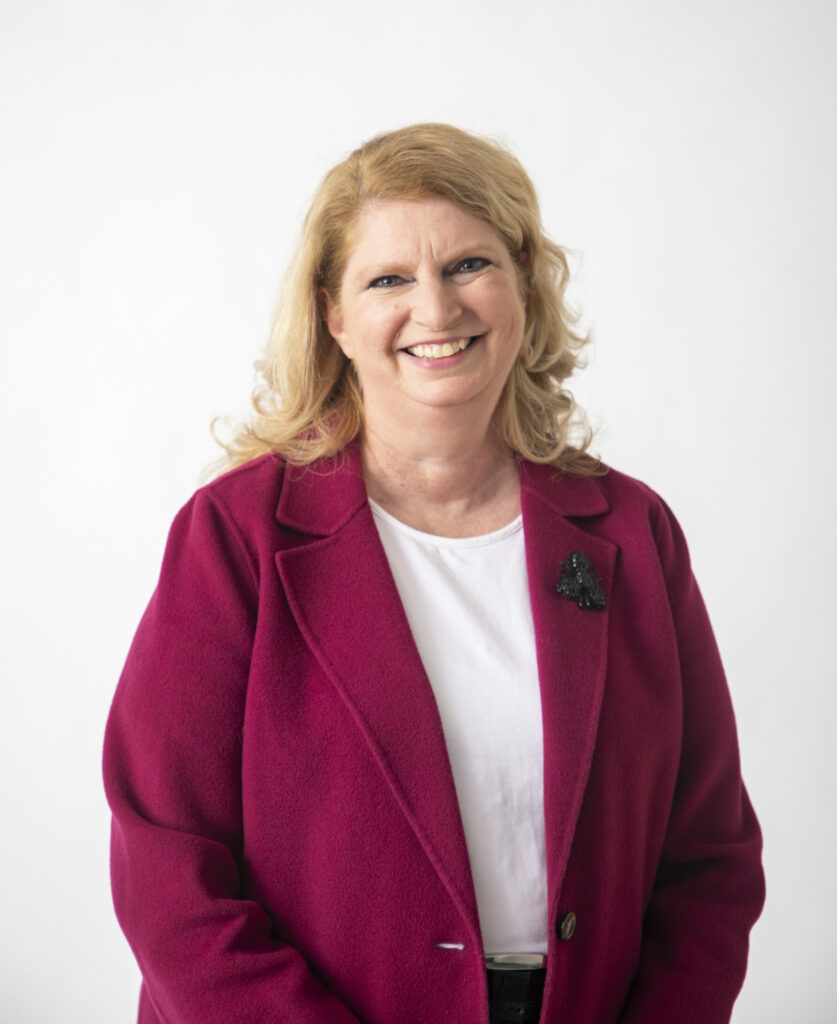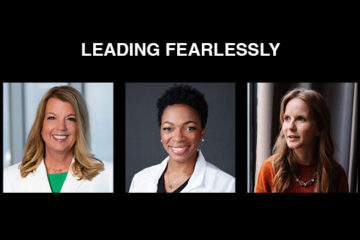
Position: President and CEO, Iowa Women’s Foundation
Hometown: Gladbrook, Iowa
Family: Husband Troy, two adult children
Education: Bachelor’s in sociology from Central College, master’s in public policy from University of Northern Iowa
Hobbies: Reading, visiting bookstores
Anyone who is deeply involved in addressing the child care crisis in the state has likely heard of the Iowa Women’s Foundation.
The Coralville-based nonprofit has been around just shy of 30 years, and works to help improve the lives of women and girls across the state through grantmaking, education and advocacy.
Under now-retired president and CEO Dawn Oliver Wiand’s tenure, IWF focused its efforts on identifying and addressing six key barriers to women’s economic self-sufficiency: employment, child care, housing, education/training, transportation and mentorship.
Following a statewide listening tour in 2015, IWF homed in on the child care barrier, particularly ramping up grantmaking and involvement in the years following the pandemic. The foundation has worked in 56 communities, offering solutions to increase the availability of quality, affordable child care. Oliver Wiand also sat on the governor’s Child Care Task Force.
Needless to say, the Iowa Women’s Foundation has played a key role in the state’s efforts in addressing the child care crisis, and has garnered national attention along the way.
“We just had a call with [someone from Massachusetts]. We’re getting a fair amount of interest from other states saying, ‘What are you doing in Iowa? We’re hearing about Iowa, what’s happening with child care in Iowa?’” said Deann Cook, who took over as president and CEO of IWF in January.
“Iowa really is leading on a lot of this work. And other states are starting to pay attention. Iowans tend to not think what they’re doing is special. We just get on with it and solve it and move on. I think there’s an opportunity for us to talk about great things Iowa’s doing and the work and the role that Iowa Women’s Foundation has played.”
The Business Record recently caught up with Cook about her vision and goals for the Iowa Women’s Foundation, including looking beyond the child care barrier.
The following conversation has been edited and condensed for clarity.
You spent 10 years at United Ways of Iowa. What drew you to the Iowa Women’s Foundation?
At United Ways of Iowa we produced several ALICE reports. ALICE stands for asset-limited, income-constrained, employed. It was about people in our state who are working, earning, doing all the things they’re supposed to do and they can’t meet a basic-needs budget where they live. In our last ALICE report, about 40% of Iowans lived below the ALICE threshold. My role was to really talk about that and raise awareness. And Iowa Women’s Foundation, they’re actually addressing those barriers to economic self-sufficiency. The ALICE report and the IWF barriers line up almost perfectly. So this felt like moving into a role where I could put some action into all that energy around ALICE.
United Way addresses many barriers that people face, while the Iowa Women’s Foundation focuses specifically on women and girls. What are your thoughts on going from an organization with a broader mission to one with that is hyper-focused on a particular group of people?
The Iowa Women’s Foundation is the only statewide organization focused on women. So I think first of all, women deserve that voice and that attention. And I know even back from my United Ways of Iowa days that strong women make strong families and households make strong communities. You have to build from the ground up. Women being economically self-sufficient is the building block of a community. To focus on that, and pay attention to that and invest in that, has value for the broader state.
What do your day-to-day responsibilities and role look like?
We’re not a huge organization. We’re a five-person team. So it’s a mix of relationship-building, coalition-building, operations and fund development for the organization and staff interaction management.
What are your goals for your position?
It’s a super exciting time for IWF. They have carved such a niche. We’ve seen it through the example of child care, but they really carved a niche as a convener, and a messenger and a voice. Watching that unfold in child care has really opened everyone’s eyes to what role this organization could play in the other barriers, whether it’s housing or employment or education. I think it’s really figuring out how we can take the lessons we’ve learned from the role that we’ve played in the child care conversation in Iowa and figure out how to replicate that with other barriers.
Were there any particular lessons or words of wisdom that you gleaned from IWF’s work with child care that you are taking into tackling the other barriers?
Let’s go back to 2014 or 2015. We had human services organizations saying child care is a problem. We had parents saying child care is a problem. We had schools saying child care is a problem. All these different sectors were saying child care is a problem, but the business community was not involved. And no one was pulling all that together. So really, what IWF came in and did was create that hub of the wheel and get it all working together. They brought convening skills, they brought messaging skills. They captured the attention of all the right people. I think we learned from watching them come into something that was not super cohesive, and bring it together, informed by people from every corner of the state, and message it back in a way that action started to happen. What other issues are out there like that, where there’s sort of a fragmented approach right now, and the Iowa Women’s Foundation can bring their statewide reach in and their data and their research and make something that’s a little fragmented right now come together to move forward?
Are there any particular areas that IWF is wanting to focus more on?
The Iowa Women’s Foundation came to their focus on child care first by going out to 18 communities across the state and saying, “OK, we know these six things are a problem. Which one do we do first?” That’s where stakeholders said, “Without child care, women can’t do any of the other things. It is foundational to them being able to go to school and work.” So we don’t have a “this barrier is next.” It is really going to be informed by some kind of process like what happened before, where we’re hearing from all corners of the state, different-sized communities, different sorts of stakeholders. We would never make that choice in a vacuum. I think that’s part of the work of 2023 is to understand where we can be most valuable in an ongoing way in child care, while also thinking about a process for how we address the other parts of our mission.
What can people expect from the Iowa Women’s Foundation in 2023?
We’ll still be a central organization in child care conversations and solutions in Iowa. And a lot of that is because we have our employer engagement director for another 2½ years. We will continue to work to build our Legacy Fund. We will continue to do grantmaking across all six of our barriers. Internally, we’re going to start that conversation about “How do we stay here and bring what we can bring to child care but also broaden out to the wider mission that we have?” I don’t know what that will look like externally yet.
What are you hearing or seeing from Iowa women right now about the current challenges that they’re facing?
The ALICE report tells us, and I think it will [continue to] tell us, that we have a huge segment of our population – that includes a lot of women – that are doing everything they can and they’re still struggling to get by. Every week, every month, every rent check is a struggle. And then you add on top of that the expense of getting child care, the difficulty of getting child care, the difficulty of finding a job that pays a wage that will allow them to live and cover the basics without stress and struggle. We haven’t solved all of that yet. I think that’s why what IWF is focused on is the right thing, because we know that that situation is not improving.
What’s it going to take to get to a point where there is real progress being made?
I am super hopeful. We have seen the business community and the policymakers really dig in and understand child care and start to find the right solutions. So that encourages me that we can find that path forward with all of the relevant players. It’s been really encouraging to see the really big growth and attention and activity and problem-solving around child care. So that tells us that if we have the right message, and we’re talking about the right things, we can motivate people to make big changes that affect people’s lives.
Throughout my reporting on the child care crisis in the state over the past few years, I’ve heard from a lot of people that the future success of child care will depend on public-private partnerships. I’d love to hear your thoughts on that and if those types of partnerships can work elsewhere, outside of child care.
Certainly, depending only on one sector to solve a problem that affects every sector is not effective. Child care isn’t just a human services problem. Child care is a workforce issue. It’s a human services issue. It takes multiple approaches and multiple funding streams to address it effectively. And so it would make sense that that can come to bear on any number of issues you might name.

